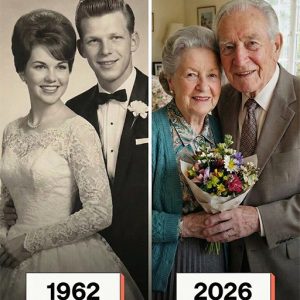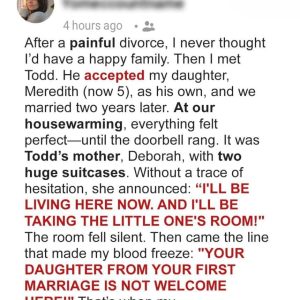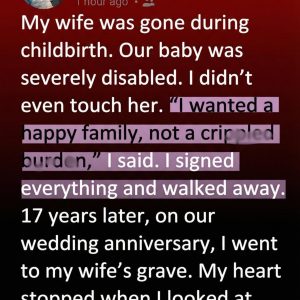My sister was born with a barely noticeable limp and my parents made it the core of their life. “She needs extra love,” they said and drowned her in money. Last year, they made a will. Sister gets everything. My name isn’t even there, like I don’t exist. But what they didn’t suspect was that I had already made peace with it long ago.
I wasn’t angry. I used to be, when I was younger. When they skipped my school play because she had physical therapy. When I got second-hand clothes while she got designer brands, “because she’s sensitive to fabrics.” When my birthday gift was a book, and hers was a pony.
But I grew up. Not in the “mature and wise” way, but in the way people do when they realize complaining changes nothing. You just… get used to being invisible. You build your own life in the background. Quietly. Carefully. Far from the spotlight.
By the time I turned twenty-five, I had already moved out. I didn’t ask them for anything. No help with college, no help with rent. I worked two jobs and studied at night. Took out loans. Burned out, got sick, pushed through. I built a little life for myself, brick by brick. It wasn’t glamorous, but it was mine.
Meanwhile, my sister floated through life on a velvet cushion. Private tutors. Travel. A car when she turned sixteen. Therapy and life coaching and pilates. My parents looked at her like she was made of glass. And I? I was the caretaker for their guilt.
So when I found out about the will—when my mom let it slip during a family dinner, after too much wine—I wasn’t shocked. I just nodded.
“She needs security,” my mom had said softly, eyes down. “You’re strong, sweetheart. You don’t need help.”
I smiled and passed her the salad. But inside me, something folded quietly.
I didn’t go home after that for a while. Not for birthdays or holidays. I sent cards, kept my distance. It was better that way.
Then one day, about ten months ago, I got a call from my sister.
“Hey,” she said, her voice all tentative and breathy, like always. “Do you think you could come help me? I… I messed up.”
Apparently, she had broken up with her long-term boyfriend, left her job at a fashion boutique (which our parents had arranged), and was now living alone in the city, completely lost.
I wanted to say no.
But I didn’t.
I took a train the next morning and showed up at her apartment. It was a disaster—laundry everywhere, dishes piled up, fridge empty except for wine and some cheese.
She looked small. Tired. Her hair was greasy, and there was a faint odor of sadness in the air. I made us tea, ordered some groceries, and started cleaning. I didn’t ask questions.
Later, as we sat on the couch, she looked at me and said, “I don’t know how to do anything.”
I waited.
She added, “I feel like a child.”
And there it was. The truth that had been whispering all along.
That night, I didn’t sleep much. I kept thinking about how a limp—barely visible now—had shaped not just her life, but mine too. How our parents’ overprotection turned into overindulgence. How they thought they were helping her, but really… they were building her a prison made of comfort.
Over the next few weeks, I stayed with her. Helped her cook, showed her how to budget, how to change a tire, how to ask questions at the bank. She cried a lot. But she also started to laugh. Sometimes genuinely.
She began walking more—long walks in the park, even joined a beginner’s dance class. She was still clumsy, but she was proud of herself. For once, not because someone told her she was special, but because she earned it.
One day, she asked me, “Do you think Mom and Dad ever saw me as a real person?”
I didn’t answer. She already knew.
Eventually, I moved back into my apartment. She was doing better. She had applied for a job as a receptionist. Wasn’t much, but she was excited.
A few months later, my dad called. “Your mother’s sick,” he said.
It was cancer. Late-stage. We were shocked. Even she was shocked.
I moved back into the family house to help.
So did my sister.
It was… strange, being back. The same house, but everything looked smaller. Or maybe I had just grown too big for it.
We split the care work. I took mornings. My sister, evenings. My dad just sat in the living room most of the time, watching old game shows.
Mom was weaker than I’d ever seen her. But one day, while I was feeding her soup, she looked at me with those same tired eyes and whispered, “I’m sorry.”
I just nodded. I didn’t need her to say more. I think she knew that.
In her final weeks, she told my sister and me stories from when we were kids. Things we’d forgotten or never knew. How scared she was when my sister was born. How the doctor told her there might be more complications. How she felt like she failed me by not protecting me from the neglect that came after.
It didn’t fix everything. But it meant something.
She passed in early spring, when the trees outside were just starting to bloom.
After the funeral, my dad sat us down and said he was redoing the will. “You girls need each other,” he said. “You’re all I have now.”
I didn’t say anything, but my sister did.
“Actually, I want to change my part of it.”
I looked at her, confused.
She went on. “I don’t need everything. I don’t want everything. You should get half. Or more. I don’t care. You raised me more than they did.”
I was stunned. She was serious.
We met with the lawyer together. She signed a statement giving up her exclusive claim. The new will reflected a split. But honestly, that wasn’t the real win.
The real win came months later.
My sister got the receptionist job. Then moved up to office assistant. She got her own tiny apartment. Nothing fancy, but she paid her own rent. She invited me over once, proud of her new toaster.
We sat on her floor eating grilled cheese, laughing at an old sitcom.
“I’m happy,” she said.
And I believed her.
Now, every Sunday, we meet for lunch. Sometimes at her place, sometimes mine. Dad joins us too, when he’s up for it. He’s softer now. Quieter. I think he’s doing a lot of thinking these days.
One time, he pulled me aside and said, “You always were the strong one. I’m sorry I didn’t see it sooner.”
I didn’t say much. I just hugged him.
And you know what?
I don’t feel invisible anymore.
Looking back, I realize this story was never about revenge. It wasn’t about getting even or finally receiving my “share.” It was about love—real, messy, human love. The kind that doesn’t always come easy. The kind that sometimes hides behind wounds, and pride, and years of silence.
We all grew in our own ways. Me, by learning to forgive. My sister, by learning to stand. And my parents, even late in life, by learning to let go.
It’s easy to resent people for what they didn’t give you. Much harder, but far more freeing, is learning to give yourself what you needed all along—and then sharing it with others.
If you’ve ever felt overlooked, like your story was lived in the shadows—trust me, your light still matters. You matter. And sometimes, healing doesn’t come in one grand moment. Sometimes, it comes in grilled cheese on a living room floor.
So if this story made you feel something, share it. Someone out there might need to hear that even the most broken families can find their way back. One small step at a time.
And hey, don’t forget to like this post if it touched your heart. Maybe, just maybe, it’ll reach someone who needs it.





